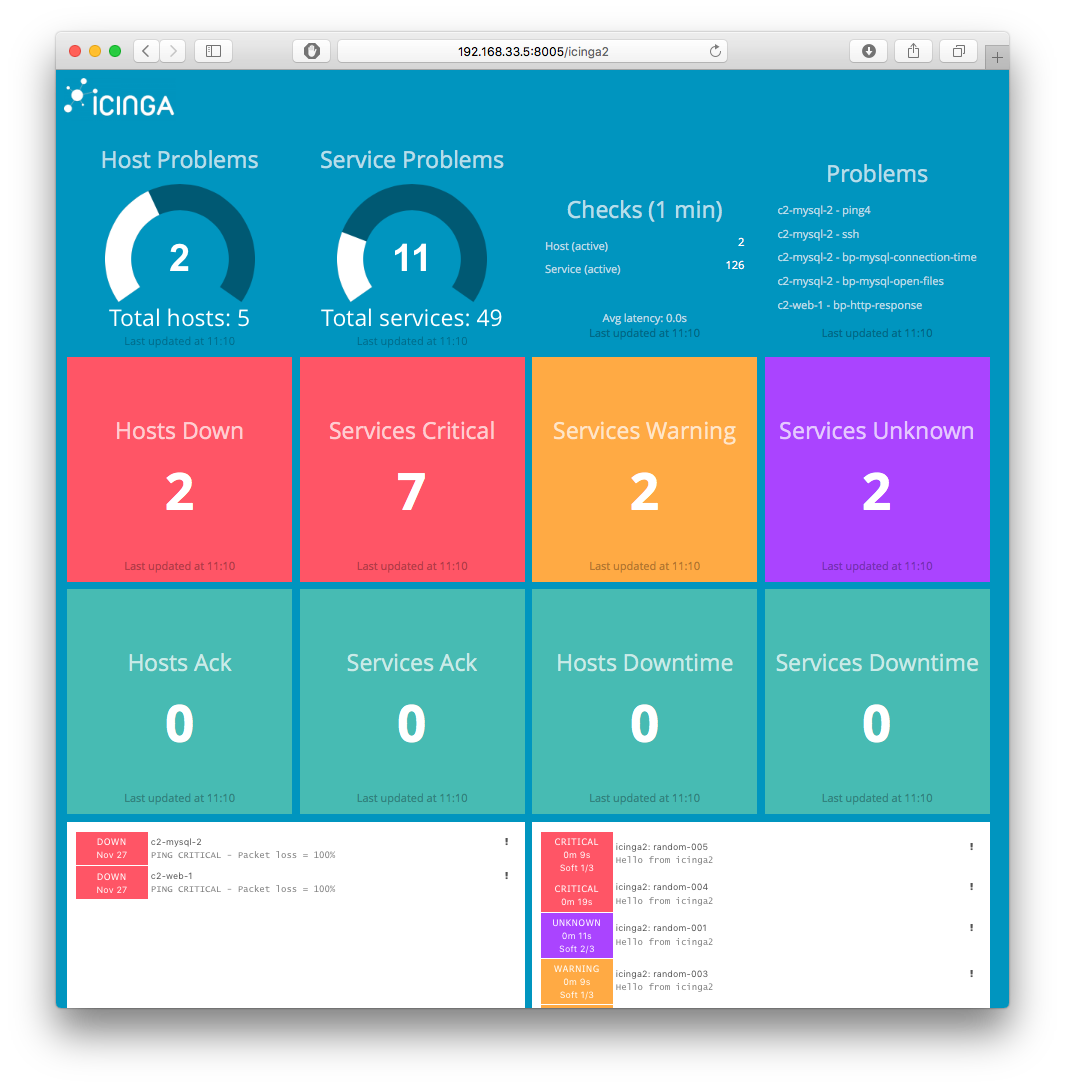Dashing is a Sinatra based framework that lets you build beautiful dashboards.
This dashing implementation uses the Icinga 2 API to show alerts on your dashboard.
A demo is available inside the Icinga Vagrant Box "icinga2x".
This is intended for demo purposes. You may use the provided examples in your own implementation.
If you have any questions, please hop onto the Icinga community channels.
- Dashing is licensed under the MIT license.
- Icinga specific jobs and dashboards are licensed under the GPLv2+ license.
- Ruby, Gems and Bundler
- Dashing Gem
- Icinga 2 API (v2.5+)
Gems:
gem install bundler
gem install dashing
In case the installation takes quite long and you do not need any documentation,
add the --no-document flags.
Icinga 2 provides either basic auth or client certificates for authentication.
Therefore add a new ApiUser object to your Icinga 2 configuration:
vim /etc/icinga2/conf.d/api-users.conf
object ApiUser "dashing" {
password = "icinga2ondashingr0xx"
permissions = [ "status/query", "objects/query/*" ]
}
Set the ApiUser permissions
according to your needs. By default we will only fetch
data from the /v1/status and /v1/objects endpoints, but do not require write
permissions.
In case you want to use client certificates, set the client_cn accordingly.
Edit config/icinga2.json and adjust the settings for the Icinga 2 API credentials.
$ vim config/icinga2.json
{
"icinga2": {
"api": {
"host": "localhost",
"port": 5665,
"user": "dashing",
"password": "icinga2ondashingr0xx"
}
}
}
If you don't have any configuration file yet, the default values from the example above will be used.
If you prefer to use client certificates, set pki_path accordingly. The Icinga 2
job expects the certificate file names based on the local FQDN e.g. pki/icinga2-master1.localdomain.crt.
Note: If both methods are configured, the Icinga 2 job prefers client certificates.
Install all required ruby gems into the system path.
bundle install --system
Now start dashing:
./restart-dashing
Additional options are available through ./restart-dashing -h.
Navigate to http://localhost:8005
On OSX El Capitan OpenSSL was deprecated, therefore you'll need to fix the eventmachine gem:
brew install openssl
bundle config build.eventmachine --with-cppflags=-I/usr/local/opt/openssl/include
bundle install --path binpaths
Note: Dashing is running as thin server which by default uses epoll from within the eventmachine library. This is not available on unix-based systems, you can safely ignore this warning:
warning: epoll is not supported on this platform
Now start dashing:
./restart-dashing
Additional options are available through ./restart-dashing -h.
Navigate to http://localhost:8005
fugstrolch for the Icinga Web 2 iframe integration. tobiasvdk for check stats widget and suggestions. bodsch for the job rewrite and config file support inspiration. spjmurray for styling and 1080p resolution. micke2k for proper time formatting. roidelapliue for the Icinga 1.x dashing script.
Fork the repository on GitHub, commit your changes and send a PR please :)
The Icinga 2 dashboard mainly depends on the following files:
- dashboards/icinga2.erb
- jobs/icinga2.rb
- lib/icinga2.rb
- config/icinga2.json
Additional changes are inside the widgets. simplemon was added. meter was modified to update the
maximum value at runtime. list was updated to highlight colors and change font sizes.
lib/icinga2.rb provides a class icinga which is responsible
for reading the configuration file, initializing the api connection
and fetching data.
Several public attributes are exposed by this class already. You'll
need to instantiate a new object and then call the run method.
Then you are able to access these attributes and public functions
such as getHostobjects and getServiceObjects. These two functions
can be called by passing
- attrs as an array of attribute strings
- filter as Icinga 2 API filter string
- joins as an array of joined objects and/or attributes
A simple test runner for testing own modifications has been added
into test/icinga2.rb. You can find additional examples over there as
well.
- Add ticket system demo (e.g. dev.icinga.org)
- Add Grafana dashboard
- Hints for Docker integration (docker-icinga2)
- Replace Dashing with Smashing
